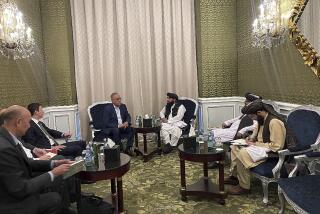Afghan leaders gather to forge future government
- Share via
PESHAWAR, Pakistan — Hoping to patch up bitter differences born of two decades of war, several hundred Afghan leaders representing exiled political groups, monarchists and anti-Taliban forces have gathered in this frontier city to discuss the creation of an alternative government for Afghanistan.
The two-day Assembly for Peace and National Unity in Afghanistan, scheduled to begin today, is the first in a series of such gatherings here, inside Afghanistan and possibly in Turkey over the next few weeks aimed at producing a ruling council, or loya jirga, acceptable to the Afghan people.
“This meeting will be a milestone for the future course of Afghanistan -- a very noble event,” said Pir Sayed Ahmad Gailani, the leader of a refugee group opposed to the extremist Islamic Taliban regime.
Gailani, who convened the Peshawar conference, said he hopes to produce a resolution by Thursday outlining the broad contours of an alternative government.
But Gailani, a royalist who supports the return of Afghanistan’s exiled 87-year-old monarch, Mohammad Zaher Shah, to whom he is related, acknowledged that the success of the meeting has been complicated by the continued U.S. bombing in Afghanistan. In addition to solidifying support for the Taliban, the strikes have prevented those in Afghanistan who support the creation of an alternative government from attending the meeting here.
“We don’t know how many will be able to make it across the border,” Gailani said.
As the U.S. campaign continues and opposition Northern Alliance forces in Afghanistan advance, there has been increased concern that diplomatic and political efforts to construct a new Afghan political structure are lagging far behind the events on the battlefront.
A senior Pakistani official estimated Tuesday that it will take “weeks if not months” to construct a viable alternative to the Taliban. This creates enormous problems for post-Taliban order if the Northern Alliance forces capture Kabul, the Afghan capital, before any interim government structure can be forged.
“Our hope is that the Afghan groups can find a common ground,” the official said in a background briefing in Islamabad, the Pakistani capital.
But the official admitted that it’s unclear just how much power and support any of the predominantly ethnic Pashtun attendees at the meeting still have. Many are aging former moujahedeen leaders who have spent years living as refugees in Pakistan or overseas.
“They have considerable conflicts of ambition. They may have exaggerated their influence, and there is no way for us to assess how much influence they still have until they actually move into Afghanistan,” the official said. He said the three measures of support are how many fighters they have, how much territory they control and how many weapons they possess.
The official noted that the Taliban’s sweeping 1996 victory in Afghanistan was built on hundreds of detailed agreements with local commanders, many of whom served leaders now in exile. U.S.-led efforts to spark an organized resistance to the Taliban in Afghanistan, particularly in the largely Pashtun south, have so far failed, the official said.
“There is no visible resistance on the ground yet,” the official said. “No divisions. No bloody battles.”
The Peshawar meeting has been ridiculed by Taliban officials. In a news conference Tuesday in Islamabad, they dismissed it as an attempt by opposition groups to win money and support from foreign powers.
“This thing has been arranged by those seeking to get assistance and money from Americans,” said Abdul Salam Zaeef, Taliban Ambassador to Pakistan. “It has become a very lucrative trade. It will not have any consequences.”
Another meeting for Afghan leaders may take place in Turkey in coming days. The meeting in Istanbul has been proposed by leaders of the Northern Alliance who don’t feel that they will get adequate representation in Peshawar.
“We will be extremely pleased if this meeting takes place in Turkey,” Turkish Prime Minister Bulent Ecevit said. But Turkish Foreign Minister Ismail Cem said the country hasn’t decided whether to allow the meeting to proceed. “We are still assessing the request,” he said. “We need to know who is coming.”
Cem’s comments reflect Turkey’s concern that the meeting could be a failure unless it has a sufficient number of ethnic Pashtuns, who make up the majority of the Afghan population.
Those concerns have resonated at the United Nations. U.N. special envoy Lakhdar Brahimi told Security Council members Tuesday that he plans to travel Friday to Pakistan, Iran and other countries in the region.
“My intention is to visit all the neighbors of Afghanistan, and I am looking forward to an opportunity to talk directly to as many Afghan parties as possible,” Brahimi said after the meeting. “This has come very strongly in discussions with the council (that) what we need in terms of political dispensation for Afghanistan is a genuinely home-grown arrangement.
“Nobody wants an arrangement that is imposed on Afghanistan. The Afghans would not accept it, and the international community, I think, understands that.”
More to Read
Sign up for Essential California
The most important California stories and recommendations in your inbox every morning.
You may occasionally receive promotional content from the Los Angeles Times.













